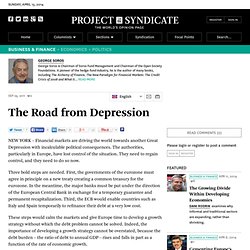

Crise Zone Euro. Who's Responsible For the Euromess? A few days ago Tyler Cowen kicked off a discussion of whether or not Germany (and the core European countries in general) have acted more virtuously than Greece (and the periphery countries in general) during the decade since the euro was introduced. It was unclear how much he was simply presenting a debating case vs. how much he actually believed his own arguments, and in that spirit I want to present a different case.
This one is about how Europe got where it is today and who deserves a bigger share of the blame for its current mess. I'm not suggesting this is the only way to look at things, or even necessarily the best way, but I do think it's an instructive way. So here it is in seven easy steps. 1. Economies of the periphery.
Most likely, both of these were part of what happened and both reinforced each other. 2. 3. 4. So all the current account deficit countries inevitably got one or the other or both. 5. 6. 7. What does all this mean going forward? Economics of the EMU. The Road from Depression - George Soros. Exit from comment view mode.

Click to hide this space NEW YORK – Financial markets are driving the world towards another Great Depression with incalculable political consequences. The authorities, particularly in Europe, have lost control of the situation. They need to regain control, and they need to do so now. Three bold steps are needed. These steps would calm the markets and give Europe time to develop a growth strategy without which the debt problem cannot be solved.
Since a eurozone treaty establishing a common treasury will take a long time to conclude, in the interim the member states must appeal to the financial authority that already exists, the ECB, to fill the vacuum. The immediate task is to erect the necessary safeguards against contagion from a possible Greek default. To accomplish these related tasks, the EFSF would be used primarily to guarantee and recapitalize the banks. The course of action outlined here does not require leveraging or increasing the size of the EFSF. The reality of China's helping hand to eurozone. By investing in Europe, China is hoping the EU will reciprocate and lift the arms embargo imposed in 1989 after Tiananmen – among other favours – writes banker George Magnus China's top brass has been proclaiming for several months that it is worried about the economic stability of the eurozone.
They say the nation will remain a long-term investor in the euro and euro bond markets. As the world's biggest creditor nation, with over $3 trillion of foreign exchange reserves, China is in pole position to lend a helping hand to Europe, as it strives to extricate itself from a sovereign debt crisis that has become an existential nightmare. So why might China be interested to do so, and how can we best judge whether it will? There are three reasons why China has vested interests in professing a commitment to European financial stability. Second, China is anxious about global financial governance, especially the role of the US dollar in the world's monetary system.
Euro Debt Crisis. Financial Crisis Europe. Eurocrisis. Euro / Greece / Debts. Europe: Grèce et autres problèmes, solutions? EURO. Euro. Crise des dettes souveraines 2010-2012. Sortir de l'euro ?